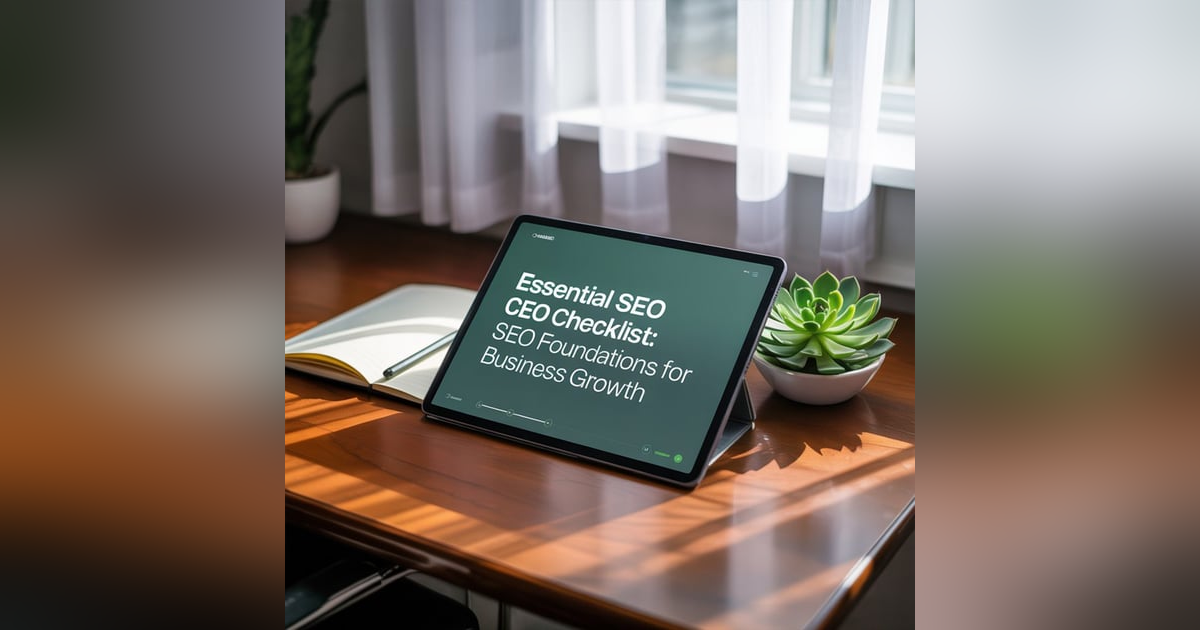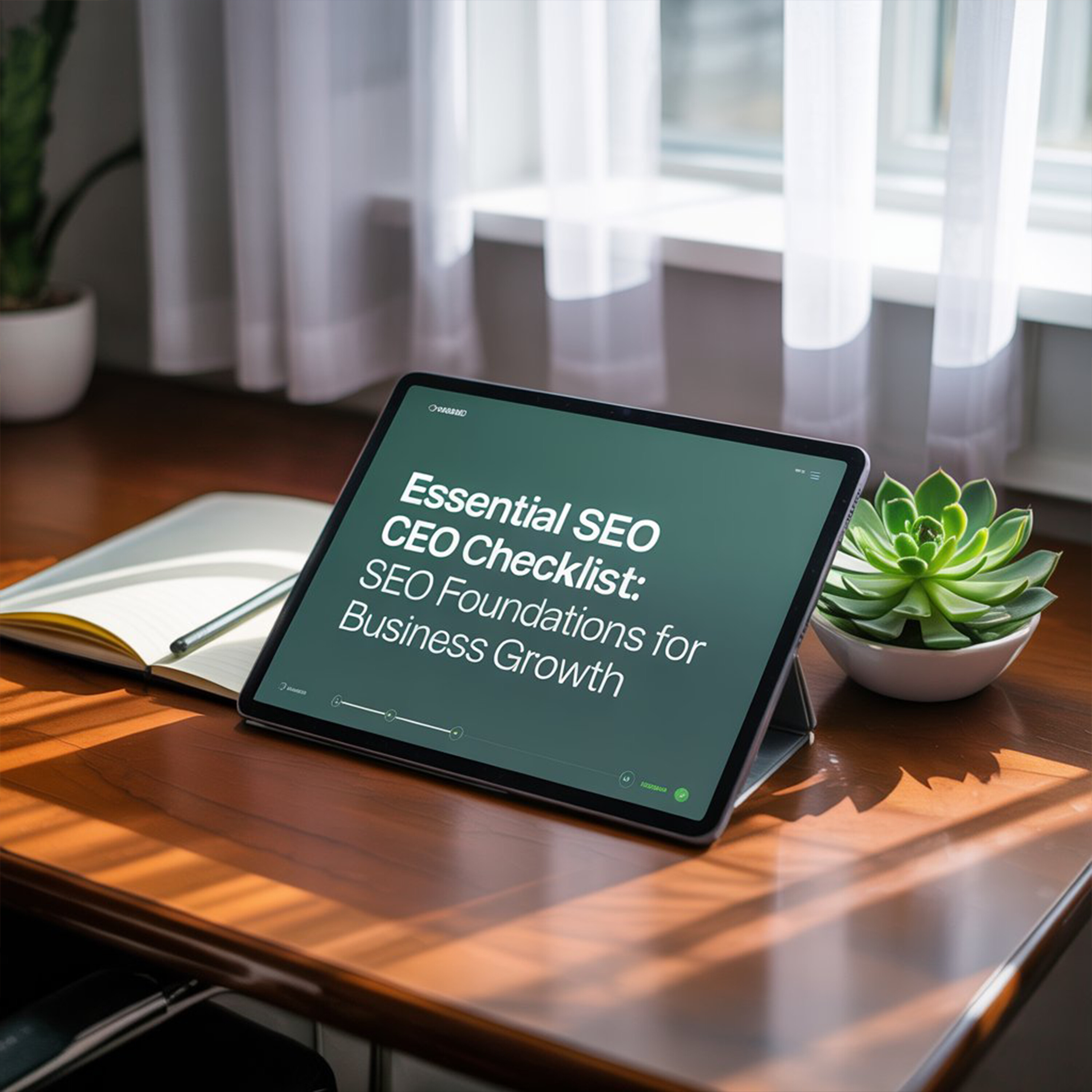AI SEO Checklist: Key Strategies for 2025 and Beyond | Marketing Essentials with Favour Obasi-Ike


AI SEO Checklist: Key Strategies for 2025 and Beyond | Marketing Essentials with Favour Obasi-Ike | Get exclusive SEO newsletters in your inbox.
In this podcast Search Engine Optimization (SEO) essential checklist episode, Favour will be sharing insights into its foundational elements and practical application for businesses. He explains how connecting websites to search consoles like Google Search Console and Bing Webmaster Tools is crucial for online visibility. The conversation also emphasizes the importance of sitemaps as the "brain" of a website, detailing how they transmit crucial information to search engines.
Key aspects such as keyword research, on-page SEO (including image optimization and meta descriptions), off-page SEO (like Google Business Profile and backlinks), content strategy, and technical SEO (mobile-friendliness, site speed, and HTTPS) are thoroughly discussed to empower listeners with actionable steps for enhancing their digital presence.
AD BREAK: Book your sessions with Somatic Massage!
Frequently Asked Questions
What are the fundamental basics of SEO that every business owner needs to understand?
The foundational basics of SEO begin with proper "setup." This means ensuring your website is connected to Google Search Console and Bing Webmaster Tools. These platforms are non-negotiable for online visibility, acting as the internet service providers that make your website findable by search engines. Just as you need internet service to be online, your website needs to be submitted to these tools to appear in search results. Furthermore, after acquiring a domain, it's crucial to select reliable hosting, which impacts your website's performance and scalability. Understanding that your website is an "intellectual property" capable of attracting traffic is key, and this visibility is achieved by making it readable, accessible, clickable, and findable, not just by its name but by the solutions it offers.
Why is a sitemap crucial for a website's functionality and discoverability?
A sitemap serves as the "brain" of your website. Without it, your website, despite looking good, lacks the functionality to transmit signals effectively to search engines. The sitemap contains links to all your website's pages, including product links, category links, blog posts, and core pages like the homepage and contact page. When you create and submit a sitemap, you are essentially providing search engines (like Google, Bing, Siri, Alexa, and even AI platforms like ChatGPT) with a structured map of your content. This allows them to index your pages efficiently, making your content discoverable when users search for relevant keywords or phrases. Updating your sitemap with fresh content ensures continuous visibility and relevance in search results.
How does effective copywriting and content formatting contribute to SEO and user engagement?
Effective copywriting and content formatting are vital for both SEO and retaining user attention. Key principles include:
- Conciseness: Sentences should ideally be 10 words or less, and paragraphs no more than three to five sentences, making content easy to skim and digest.
- Action-Oriented Language: Start sentences with verbs or adverbs to encourage engagement.
- Headings and Subheadings (H1, H2, H3 tags): Use these to break up text, provide clear structure, and help search engine crawlers understand the content's hierarchy. Google's web crawlers read and index these tags, which can improve your visibility in "people also search" sections.
- Impact Statements: Include a clear thesis upfront and a strong closing statement.
- White Space and Bullet Points: Utilize these to enhance readability and prevent overwhelming blocks of text.
- Clarity and Specificity: Your content should be clear, legible (consider font size for various screens), and directly address specific user queries. This ensures that users find value and direction, leading to higher engagement and conversion rates.
Ultimately, good copy stops the "scroll" and encourages visitors to stay longer, signaling relevance to search engines and increasing the chances of conversion.
How does on-page SEO optimization, particularly image and link optimization, improve website performance?
On-page SEO involves optimizing individual web pages to rank higher and earn more relevant traffic in search engines. Key aspects include:
- Image Optimization: This goes beyond just changing file formats. It involves compressing images (e.g., using compressor.io) to reduce file size without losing quality. Large image files slow down website loading speeds, leading to higher "bounce rates." Renaming image files with relevant keywords also signals content to search engines.
- Internal Links: Linking to other relevant pages within your website improves user navigation and helps search engines understand the structure and depth of your content.
- External Links: While some may fear sending users away, strategically linking to credible external sources (like social media profiles, features on other sites, or relevant industry resources) can enhance your website's authority and provide additional value to users.
- Meta Descriptions and Title Tags: These provide a brief summary of your page's content, influencing click-through rates from search results. A compelling meta description, similar to an email's preview text, encourages users to click.
Optimizing these elements ensures a faster, more engaging user experience, which is positively rewarded by search engine algorithms.
Why is off-page SEO important, and what are some key strategies?
Off-page SEO refers to actions taken outside of your website to improve its search engine ranking. The primary goal is to build your website's authority and credibility through external signals. Key strategies include:
- Google Business Profile: Essential for local businesses, this profile allows you to list your services, receive reviews, and appear in local searches. Positive reviews, especially those containing relevant keywords like "best pizza" or "amazing service," act as strong validation signals.
- Backlinks: Obtaining links from high-domain-authority websites (e.g., Medium.com, LinkedIn, Blogger.com, Hubpages.com) significantly boosts your site's credibility and search ranking. These are known as "parasite SEO" techniques. Writing articles on these platforms and embedding links back to your site drives referral traffic and builds authority.
- Online Reviews: Encouraging reviews on platforms like Trustpilot or the Better Business Bureau (BBB) helps build trust and signals to search engines that your business is legitimate and valued by customers.
These off-page efforts extend your online presence beyond your website, validating your business as a trusted source of information and services.
How does content SEO contribute to long-term website success, and what are common pitfalls to avoid?
Content SEO focuses on creating high-quality, relevant, and engaging content that attracts and retains an audience. Key elements include:
- Table of Contents: For longer articles, a table of contents enhances user experience and helps search engines understand the content structure.
- Updating Old Content: Regularly refreshing existing articles ensures they remain current and relevant, signaling to search engines that your content is up-to-date and valuable. This also helps you "stay credible" in the ever-evolving digital landscape.
- Engaging Intros and Formatting: Compelling introductions grab attention, and using bold sentences, headings, and subheadings (H1, H2, H3 tags) improves readability.
- Conversational Tone: Engaging with your audience "as a conversation" rather than talking "at them" builds connection and trust.
A common pitfall is producing content without a clear understanding of what your audience needs or wants. By actively listening to your community (e.g., through polls) and delivering content that addresses their specific "queries" and "solutions," you build loyalty and ensure your efforts are not wasted.
How has the rise of AI impacted SEO, and what technical SEO elements are now more critical than ever?
The rise of AI has transformed SEO, making it more critical than ever. AI platforms like ChatGPT, Siri, and Alexa increasingly pull information from structured data on websites to answer user queries. This means:
- Structured Data (Schema Markup): Implementing schema markup for events, products, recipes, FAQs, and other content types helps AI agents understand your content's context, making it more likely to be featured in AI-powered search results.
- Authority and Credibility: AI prioritizes information from authoritative sources. Therefore, having a strong online presence with a well-structured and regularly updated website is paramount for being referenced by AI agents.
- Mobile-Friendliness and Site Speed: These remain crucial. Websites must load quickly on all devices, as slow loading times lead to high bounce rates, negatively impacting SEO.
- HTTPS Protocol: Ensuring your website uses HTTPS (secure) instead of HTTP is a fundamental SEO requirement. Insecure sites are penalized in search rankings.
- Broken Link Management: Regularly checking and fixing broken links (e.g., using tools like Siteliner.com) maintains a healthy website and prevents negative user experiences.
- SEO-Friendly URLs: URLs should be clear, relevant, and incorporate keywords to enhance discoverability.
In essence, SEO and AI are "Siamese twins" in the digital world. SEO is evolving into "thought leadership," where a mix of audio, video, and text content (like podcasts and YouTube channels connected to a website) with structured data will be key to success in the AI-driven future. The focus is shifting from merely "ranking" to making an "impact" by reaching the right people and establishing authority in your niche.
Digital Marketing SEO Resources:
>> SEO Optimization Blogs
Brands We Love and Support
Loving Me Beauty | Buy Vegan-based Luxury Products
Unlock your future in real estate—get certified in Ghana today!
See Privacy Policy at https://art19.com/privacy and California Privacy Notice at https://art19.com/privacy#do-not-sell-my-info.


